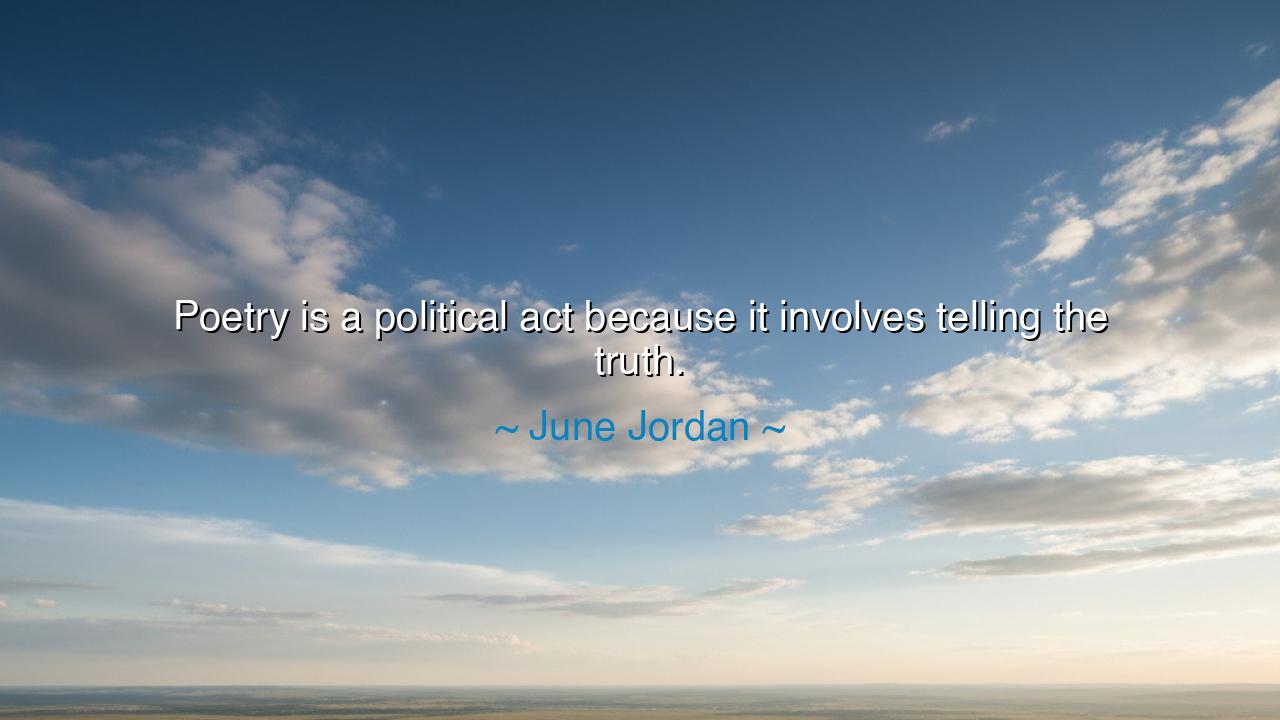
Poetry is a political act because it involves telling the truth.






Hear the blazing words of June Jordan, poet, prophet, and fighter for justice: “Poetry is a political act because it involves telling the truth.” In this utterance, she binds the intimate craft of verse to the vast struggles of nations and peoples. For poetry is not only a private song; it is a torch held against the darkness, a refusal to be silent when silence serves oppression. Every poem that dares to speak truth challenges lies, unmasks hypocrisy, and resists the forces that would bury reality beneath deceit. Thus, for Jordan, every line of honest poetry is already political, because to tell the truth is to disturb the structures built upon falsehood.
The meaning of this quote is both simple and profound. Governments, empires, and powers of every age thrive on controlling narratives—deciding what may be said, what may be believed, what must be forgotten. But poetry belongs to no throne. The poet, by naming what is truly seen and felt, becomes a rebel against the empire of lies. Even the simplest truth—that the poor are hungry, that the oppressed suffer, that the earth is alive—becomes a dangerous declaration in a world built on denial. Thus, in Jordan’s vision, the poet cannot escape politics, for in speaking truth, he enters the battlefield of power.
The ancients knew this. Consider the Hebrew prophets—Isaiah, Jeremiah, Amos—whose words were poems of fire, declaring justice, condemning kings, warning of destruction if the poor were trampled and the widow ignored. Their truth-telling was poetry, and their poetry was political, shaking empires and stirring the conscience of nations. Or recall Solon of Athens, the lawgiver who wrote poems that not only described beauty but called for reform, urging balance between rich and poor. In both cases, poetry was no escape from the world; it was the weapon of truth that shaped it.
History repeats this lesson in more recent times. Pablo Neruda, the Chilean poet, used his verse to denounce fascism and imperialism. His poetry carried the truth of his people’s struggle, and for this he was hunted, censored, and forced into exile. Yet his words outlived his persecutors, becoming a banner for justice across the world. Likewise, the Harlem Renaissance poets—Langston Hughes, Claude McKay, and later Jordan herself—used poetry to tell the truths of Black life in America, truths the nation wished to deny. Their lines were acts of resistance, for they named what power sought to erase.
Yet Jordan’s vision is not confined only to grand battles. Even the truth of a single life—the truth of love, of identity, of pain—can be political. To declare “This is who I am” in the face of a society that denies your existence is an act of defiance. For her, poetry was a way to affirm humanity against systems that sought to erase it. Every honest word became a step toward liberation, for it broke the silence that keeps injustice in power.
The lesson for us is clear: do not separate poetry from life, nor truth from courage. Every time you speak what is real—whether in verse, in speech, or in action—you engage in the politics of truth. Do not imagine that poetry is neutral; words shape worlds, and silence sustains oppression. To write honestly is already to resist, to declare that your voice and your vision will not be silenced.
Practical is this path: when you write, speak without fear. Name the injustices you see. Tell the truths of your own life and the lives of those silenced. Read the poets who risked everything to tell their truths, and let them guide your own courage. For as June Jordan teaches, poetry is a political act because it involves telling the truth—and in a world where lies are power, truth itself is the most revolutionary act of all.






HQHao Quan
I love how this quote ties poetry to activism. It suggests that poetry is not just an art form but a form of resistance. But I wonder if this perspective could be limiting. Is it possible for poetry to be purely expressive, exploring beauty, love, or personal emotions, without necessarily taking a political stance? Can poetry be both political and personal, or do they always have to overlap?
BPGia bao Pham
June Jordan's statement makes me think about the courage it takes to speak the truth through art. Poetry often gives voice to marginalized communities or underrepresented perspectives. But is there a danger in assuming that all poetry is political? Can poetry be an escape from the political struggles of the world, or is there a responsibility for poets to engage with societal issues?
NNy
I find the idea of poetry as a political act fascinating. It implies that speaking the truth, especially in a world where facts can be manipulated, is inherently subversive. But what happens when the truth is subjective? Can poetry still be a political act if the truth being told is different for every individual? Is it possible for poetry to unite people on the basis of a shared truth?
Bbchshiin
This quote really resonates with me because it suggests that poetry has the power to challenge the status quo. By telling the truth, especially uncomfortable truths, poets have the ability to shake societal norms and bring attention to issues that need to be addressed. Do you think poetry can still be a political act today, or has it become more personal and less impactful in terms of social change?